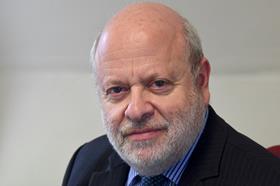Major news stories very often impact the legal profession, even if we are not their direct subject. Thinking about their consequences shows how our professional lives might change in the near future.

If you take just this last week, we had three violent storms, one after the other – Dudley, Eunice and Franklin - and may be expecting Gladys, Herman and Imani soon. Many solicitors, even those who doubt that climate change has anything to do with the legal profession, will be busy in the coming months with insurance and personal injury claims and other contractual and tortious events arising out of flooding, travel disruption or electricity cuts to homes and businesses.
It is presumably unprovable that three storms in a week had anything to do with climate change. Doubters will argue that there have always been winter storms. But the recent pattern of violent and unpredictable weather is clear for anyone following the news. And I predict that, slowly but surely, the profession will see that a new area of work is arising, requiring a new approach to training and maybe even ethics.
The question of ethics often triggers protests, on the basis that climate change raises nothing new. But Clifford Chance recently announced that it has developed a policy that could see it move away from matters that present climate change risks, to the point of deciding whether to take on such clients.
The next big news story is the threatened invasion of Ukraine, maybe a reality by the time you read this.
There are regular press reports that the UK is a weak link in the attempt by NATO allies to threaten Russia with the most severe sanctions. For instance, it is said that the UK government is being pressured by the US because of lax UK laws allowing Russian money to pass through the London laundromat. And our EU allies are apparently frustrated by the UK’s failure to introduce beneficial ownership rules for property owned through anonymous offshore structures, undermining potential sanctions against named Kremlin supporters.
It is not a secret that UK law firms have (lawfully) enabled many Russian oligarchs to hide their funds in the UK through property purchases and other transactions. Nor is it a secret that London law firms have been involved in the laundering of those same oligarchs’ reputations through litigation which silences critics. But as the atmosphere tangibly changes for such activity – witness the recent House of Commons debate fiercely criticising some UK law firms for furthering Russia’s hybrid warfare – there must surely be law firm discussions going on similar to Clifford Chance’s internal discussions about climate change: should we be taking on such clients in the future, given international tensions? I imagine changes will come.
The third big news story relates to the ongoing threats to the union of the UK – negotiations over the Northern Irish protocol and the possibility of an eventual referendum on a united Ireland, or the continuing threat of a referendum on Scottish independence. This might be thought to pose the least change to solicitors, because of the existing three UK legal jurisdictions. Any separation would not alter our lawyers’ titles or regulation. Maybe that is why so little has been written on the effect of a possible break-up on our profession.
Yet that always ignores the very jurisdiction of which we are solicitors, which is a joint jurisdiction, England and Wales. Most people think of Northern Ireland or Scotland, but not Wales.
It is now 22 years since Wales achieved devolution, and over 10 years since the Welsh Parliament (Senedd) was granted primary law-making powers. The pandemic has made the distinctness of Welsh law even more obvious, and there are now significant differences in areas like education, planning, social services, housing, and local government. But justice is not yet devolved. Those who favour independence for Wales realise that it is a prerequisite. There is a recently established Law Council of Wales, to promote legal education and training and awareness in Welsh law, and support the economic development and sustainability of the legal sector in Wales.
To peer into the future, one day those of us on the English side of the border might end up being just solicitors of England. Would that make any difference to our professional lives? I am sure that there would be liberal practice rights either way across the border. And many lawyers and clients abroad often mistakenly (and infuriatingly) refer to the whole of the UK as England anyway, so I assume that our international profile would not change.
But we need to think more about what any potential break-up of the UK might do to our profession, so that we can prepare for it.
Similarly, it pays to think of the lawyers’ side of all major news stories for the same reason.
Jonathan Goldsmith is Law Society Council member for EU and international matters and a former secretary general of the Council of Bars and Law Societies of Europe. All views expressed are personal and are not made in his capacity as a Law Society Council member, nor on behalf of the Law Society































3 Readers' comments